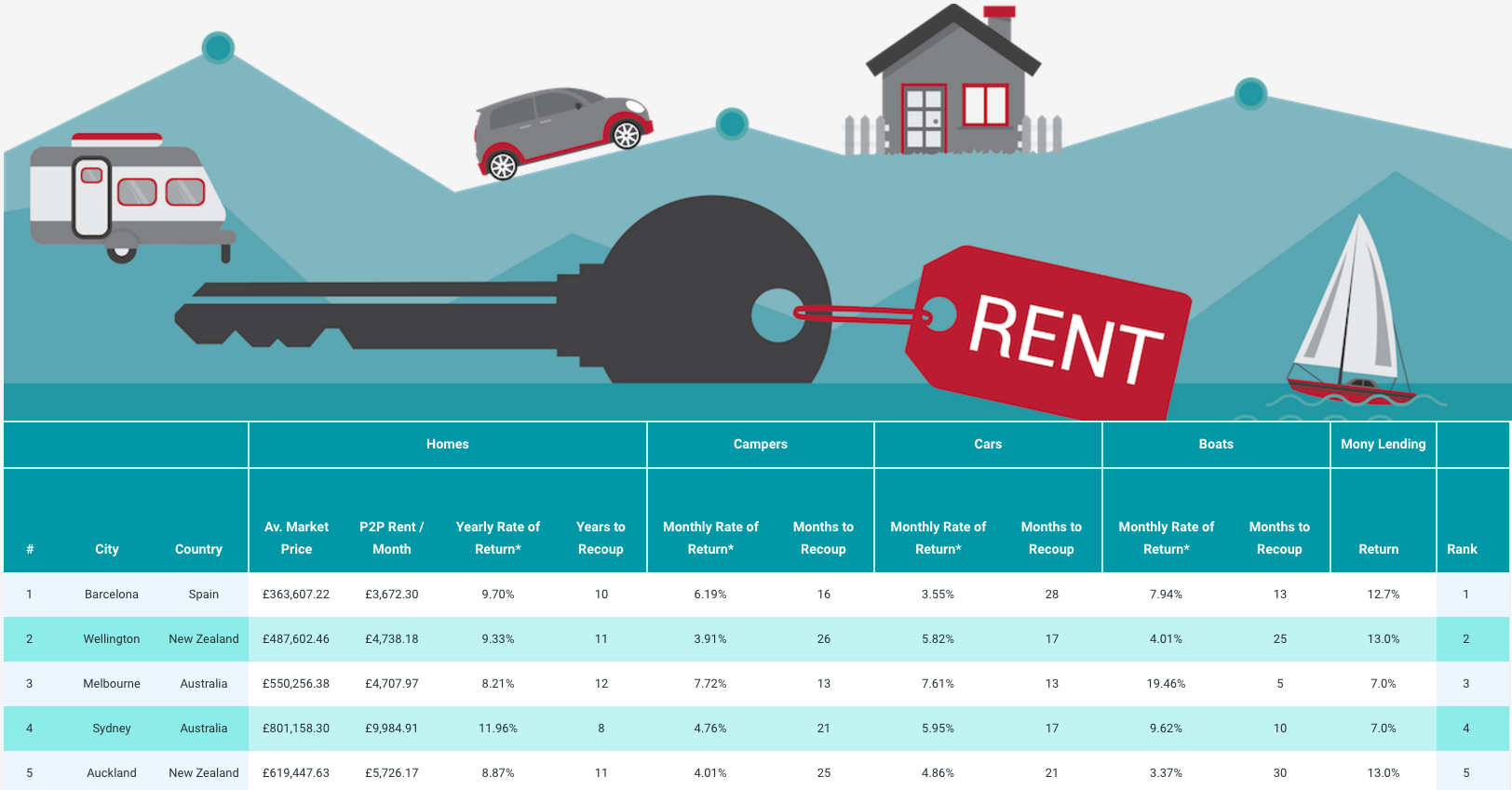The likes of Uber and Airbnb may have paved the way for other start-ups, but beyond the business opportunity, the sharing economy has opened up financial opportunities for individuals using their property for a wide new range of accommodation, transportation, and leisure services. As cities create new frameworks and legislation to support the longevity of the gig economy, a new study looks into the time needed to recover investments using various shared economy business models around the world.
The 2017 Sharing Economy Return on Investment Index reveals that Barcelona is the best city to pay off an investment across all business models of the sharing economy, while Frankfurt is the best place to buy a home and pay it off using platforms such as Airbnb or Homeaway. Copenhagen is the best place to pay off a camper quickly, and the city with the highest return on investment (ROI) for a car is Zurich, while the city with the highest ROI for a boat is Melbourne, Australia. New Zealand offers the highest returns for investors on peer-to-peer money lending platforms.
In this global study of 31 cities, London placed in 31 position in the ranking, taking into account all five of the markets researched.
“The sharing economy offers great individual experiences as well as flexibility. With peer to peer rental, people can make memories in the camper, car, or boat they’ve always dreamed of owning. Similarly, everyday people can pay off investments simply by renting out underused assets,” states SHAREaCAMPER CEO Florian Dahlmann. “The biggest lesson of our research is that you don’t need to charge exorbitant rental rates to pay off your investment. We are huge fans of win-win situations like this and we hope this research encourages development in more hesitant markets.”
Peer-to-peer motorhome rental platform SHAREaCAMPER ran this global study to identify which cities offer the highest return on asset investment via rental peer-to-peer (P2P) platforms such as Drivy or Homeaway. The Index is broken down into five categories of peer-to-peer rental: homes, campers, cars, boats, and money lending.
For 31 cities with highly developed sharing economies, rankings were calculated by analyzing the ratio of market to P2P rental prices, including any fees paid by the owner, for more than one thousand assets per city. Cities were ranked by a grand total of the time needed to recoup investments, based on the return of investment percentage, in each of the five categories according to the asset-specific occupancy rate.
The data was collected via rental platforms such as Homeaway, Airbnb, Drivy, SHAREaCAMPER, Outdoorsy, Turo, Snappcar, GoMore, Sharoo, Campanda, Yescapa, Boathound, Yachtico, and Getmyboat.
The five best cities for a high ROI

London was at the very bottom of the list of 31 sharing economy hubs.
For homes, even though the average market price was the highest, at £1.7 million, the study projects a 20 year period to recoup the investment. For campers, it is expected to take 39 years to recoup, while cars will take 21 years and boats 23 years.
According to Peninsula’s annual Working Nation report, the UK’s ongoing struggle defining the parameters of the gig economy may be a reason for the sector’s volatility.
Related: Ensuring the future of the UK’s sharing economy – What, if anything, can the Government and policy-makers do to support such a booming British market?
“On the one hand, we have a modern model of working that affords people greater freedom and flexibility to manage their lives outside of standard working hours. On the other, we have what some view as a form of workplace exploitation that dismisses basic employee rights such as entitlement to national minimum wage and holiday pay. In some instances, the lines between our traditional idea of self-employment and this new structure of on-demand working are becoming increasingly blurred.” Peninsula Working Nation 2017.
Following a string of high-profile tribunal cases involving organisations such as Deliveroo, CitySprint and Uber, the UK Government is now intent on clarifying the parameters around the gig economy, zero hour contracts and other forms of casual employment.
In October 2016, Prime Minister Theresa May commissioned a national inquiry into new ways of working in the UK. The goal of this inquiry is to ensure employment law and HR legislation is up to date with today’s world of work, builds a stronger framework for casual working and safeguards employees from exploitation.
A recent study into SME hiring revealed that gig economy workers are employed at more than a quarter of UK SMEs, and are credited for business growth. According to Zurich’s Paul Tombs, this is a testament to the potential of the sharing economy, especially if allowed to grow unfettered.
“With so many UK SMEs employing gig economy workers, it would be a mistake to characterise the entire gig economy as an exploitative tool that only benefits employers. Self-employment is on the rise and demonstrates an increasing demand for flexible work which is beginning to shape the way that businesses think about workforce management,” he said.
A survey by the Office of National Statistics on Trends in self-employment in the UK highlighted that the level of self-employment had increased by around 730,000 between 2008 and 2015: rising from 3.8 million to 4.6 million. The UK also saw an increase of 182,000 self-employed people between 2016 and 2016, making a total of 4.69 million Brits working for themselves so it’s clear the trend is growing.
Technology in the way of improved communication and connectivity, trust in the autonomy and work ethics of employees to function with less supervision, and benefits in that agile workers and freelancers cost less both in payroll, benefits, sickness, holidays and utilities, have all made businesses pay attention to this growing way of resourcing.
Freelancing or “gig” work is going mainstream and may even overtake the so-called “portfolio career” by taking the idea of a career that moves with the individual, rather than dictating to them, over time. In a recent PeoplePerHour survey, 65 per cent of 18 to 24 year olds said that freelancing was part of their long-term career plan, meaning that business need to offer millennials a way to sustain their levels of travel and freedom through flexible working in order to harness their talent.
Freelance workers are also happier and more productive, bringing added value to businesses. A 2014 study by economists at the University of Warwick found that happiness led to a 12 per cent increase in productivity, while unhappy workers proved 10 per cent less productive. Hiring freelancers, who have a proven higher rate of happiness is therefore likely to result in faster and more effective project completion. A study by McKinsey noted a “substantial difference in the satisfaction levels of independent workers and traditional employees” with independent, or freelance workers scoring higher across the board for both work and life.”
A YouGov survey, commissioned by freelance marketplace, PeoplePerHour, also found that freelancers were enjoying life more than those in traditional working frameworks. 9 per cent of Brits travel up to three hours or more each day. 44 per cent of self-employed surveyed said they work from home and have no commute, meaning they have 720 hours or one month every year more to use for work or leisure. In additional, 24 per cent of employed people surveyed spend no time exercising each week, versus just 18 percent of self-employed.
Since 2007, PeoplePerHour has seen exponential growth, with a 433 per cent increase in UK freelancers since 2012. They now have 1.5 million users now visiting the site every month to buy and sell time and skills in a way that is flexible for both businesses and freelancers. “Startups and SMEs can’t always afford to strike out with new projects by hiring new teams on a permanent basis, so those looking to grow their business will benefit hugely from outsourcing to skilled freelancers. They get all the benefits of working on a more targeted basis with experts in their field, but without huge overheads and setup time,” says PeoplePerHour CEO, Xenios Thrasyvoulou.
Pressure from a growing workforce of freelancers may boost London’s gig economy from the supply side, which could give it the push it needs to stay competitive amid regulatory upheavals.






